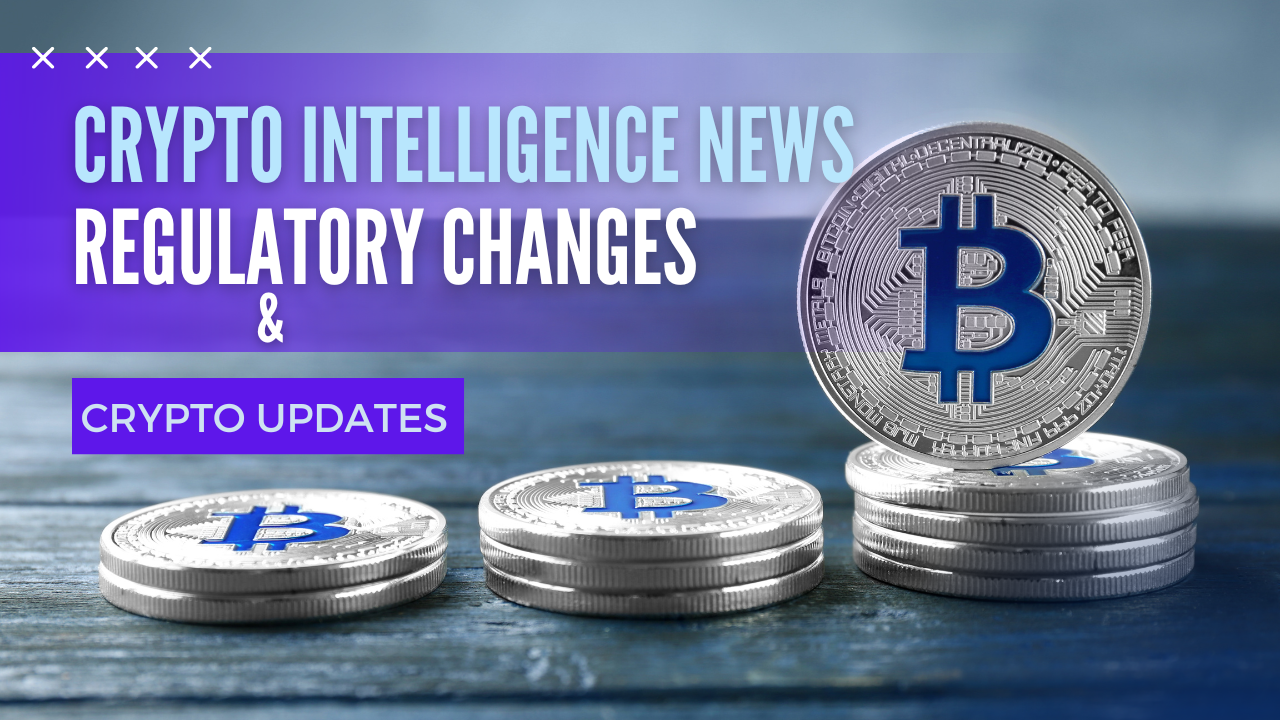Table of Contents
Cryptocurrency’s journey since 2009 has been a rollercoaster of innovation and uncertainty, pushing governments and regulators worldwide into a constant search for effective control measures. So, what have they managed to come up with?
As the years pass, the realm of cryptocurrency regulation is progressively tightening its grip, reflecting a global trend towards increased oversight and control. The journey is slow and often leads to disagreements, which in turn poses a significant challenge for businesses in the crypto space to stay compliant and grasp all the emerging nuances.
Therefore, we’ve gathered the crypto intelligence news and important laws that are shaping the crypto landscape in 2024. We’ll focus on updates from different countries and areas, because it’s crucial for businesses to understand the various regulations they might face.
Let’s get started!
What Is SEC And What Does It Have To Do With Crypto?
The Securities and Exchange Commission (SEC) is a federal agency in the United States responsible for enforcing federal securities laws and regulating the securities industry, the nation’s stock and options exchanges, and other related activities and organizations.
The jurisdiction of the SEC over securities is broad and encompasses the issuance, sale, and trading of securities to protect investors; maintain fair, orderly, and efficient markets; and facilitate capital formation.
Securities are defined under U.S. law by the Securities Act of 1933 and the Securities Exchange Act of 1934. The definition includes traditional instruments such as stocks, bonds, and notes but can also apply to other investment contracts if they meet certain criteria.
The Supreme Court’s decision in SEC v. W.J. Howey Co. (1946) provided a test (known as the Howey Test) to determine whether an instrument qualifies as an “investment contract” and thus a security under U.S. law. According to the Howey Test, an investment contract exists if there is an investment of money in a common enterprise with a reasonable expectation of profits to be derived from the efforts of others.
Crypto Intelligence News: To Regulate Or Not To Regulate?
The debate over whether certain cryptocurrencies qualify as securities primarily revolves around the definition and application of the Howey Test.
Crypto Intelligence News often highlights how many cryptocurrencies operate on decentralized networks using blockchain technology developments, raising questions about how traditional regulatory frameworks apply to these new types of assets.
As Crypto Intelligence News reports, the evolving nature of these assets makes it challenging to fit them into existing regulations, further fueling the ongoing discussion within the crypto community.

Cryptocurrencies As Commodities Vs. Securities
Some cryptocurrencies, like Bitcoin, are often considered commodities rather than securities because they do not represent an investment in a single enterprise and do not provide owners with a claim on future profits.
However, other crypto assets, especially those offered through Initial Coin Offerings (ICOs) or token sales, may be considered securities if they meet the criteria established by the Howey Test.
SEC’s Position
Crypto Intelligence News reports that the SEC believes many ICOs and token sales involve the offer and sale of securities, thus falling under its regulatory purview. The agency has taken enforcement actions against several projects it deemed to have issued securities without proper registration or exemption.
However, Crypto Intelligence News also notes that the SEC has stated not all cryptocurrencies are securities and that the determination requires a facts-and-circumstances analysis. This nuanced approach by the SEC is often highlighted by Crypto Intelligence News to help investors and projects navigate the complex regulatory landscape.
SEC Crypto Regulation: 2024 Updates
According to crypto intelligence news, in 2024, the SEC has already introduced several updates to its regulatory framework for crypto and DeFi sectors. Let’s take a closer look at them.

Green Light To Bitcoin ETF
On January 10, 2024, Crypto Intelligence News reported a significant regulatory milestone as the SEC approved rule changes enabling the establishment of Bitcoin ETFs in the United States.
This pivotal decision opens doors for mainstream investors to participate in the Bitcoin market, known for its high volatility and innovation. According to Crypto Intelligence News, this move is seen as a major step forward in legitimizing Bitcoin as a mainstream investment option.
The crypto community has warmly received this development, recognizing it as a monumental step forward in legitimizing cryptocurrency as an accessible investment option for the general public.
Crypto Intelligence News highlights that this approval is seen as a crucial advancement in integrating cryptocurrencies into the broader financial market, reflecting the growing acceptance and potential of digital assets. According to Crypto Intelligence News, this move could greatly enhance the credibility and reach of cryptocurrencies among traditional investors.
SEC’s New “Dealer” Definition Impacting Crypto
On February 6, 2024, the SEC crypto regulation adopted new rules. These mandate a broader spectrum of market participants to register with the SEC, affiliate with a self-regulatory body, and comply with existing securities laws and regulations.
This move, primarily detailed in a 247-page document, aims to extend regulatory oversight over the cryptocurrency and DeFi sectors by redefining terms such as “dealer” and “government securities dealer” and clarifying what constitutes engaging “as a part of a regular business” under the Securities Exchange Act of 1934.
These regulations target entities that significantly contribute to market liquidity. To fall under these new rules, entities must manage or control assets worth at least $50 million.
The reaction to this update wasn’t very positive. The DeFi Education Fund criticized the SEC’s new rules as misguided, highlighting a lack of viable compliance paths for DeFi participants and calling the approach impractical and innovation-stifling.
According to Crypto Intelligence News, this criticism underscores the challenges faced by the DeFi sector in navigating regulatory frameworks while maintaining its innovative edge.
Impact Of SEC Crypto Regulation Updates On The Market And Investors
The updates to SEC crypto regulations in 2024 are expected to significantly affect both the cryptocurrency market and its investors. By approving the establishment of Bitcoin ETFs in the U.S., the SEC has opened the door for broader investment in cryptocurrencies, potentially stabilizing and increasing market confidence in these assets.
However, the SEC’s expanded definition of “dealer” has sparked concern among DeFi participants and the wider crypto community. This redefinition could place considerable regulatory burdens on entities within the crypto space, potentially slowing down innovation and complicating compliance efforts.
In the end, achieving the right regulatory balance is essential. Regulations in general serve to safeguard investors from fraudulent schemes and ensure market integrity. For example, by enforcing Know Your Customer (KYC) and Anti-Money Laundering (AML) guidelines, authorities can prevent the misuse of crypto platforms for illicit activities.
Such measures are generally welcomed because they enhance the safety and attractiveness of cryptocurrencies as an investment option, potentially drawing more participants and bolstering market robustness.
However, there’s a risk that excessive regulation could undermine the foundational principle of crypto: decentralization. Cryptocurrencies were designed to operate without central oversight, but if compliance with complex regulations becomes feasible only for large, well-resourced companies, the crypto ecosystem could lean towards centralization.
Now, regulators are faced with the complex challenge of crafting laws that would preserve the beneficial attributes of cryptocurrencies — their capacity for innovation and decentralization — while also mitigating potential risks.
What Else You Need To Know Crypto Regulation News Across Countries
Let’s delve into the latest crypto intelligence news from across the globe, highlighting significant developments.
In October 2023, the U.K. government unveiled the “Future Financial Services Regulatory Regime for Cryptoassets,” marking the completion of its framework for cryptocurrency regulation.
The document emphasized a phased approach to integrating the crypto intelligence news ecosystem into traditional financial oversight. Beginning with legislation for fiat-backed stablecoins set to be introduced in 2024, the framework plans to extend regulation to other crypto domains, including algorithmic stablecoins, lending, and trading. This comprehensive strategy will place activities under the supervision of the Financial Conduct Authority (FCA).
Further detailing the regulatory scope, the government clarified that the new rules would not encompass crypto assets already recognized as traditional financial instruments, nor unique NFTs viewed as collectibles or artwork. However, NFTs acting as exchange tokens could be regulated in the future.
The document acknowledges that while the DeFi sector is presently small in size, its potential impact on financial services is significant as the crypto industry expands and blockchain technology gains traction within financial markets.
Thus, the government intends to support innovation and will not ban DeFi.
Which Crypto Is Working On Artificial Intelligence?
Various cryptocurrency and blockchain projects integrate artificial intelligence (AI) to improve their capacities and create new solutions. Fetch.ai is among them, and it has a decentralized digital economy that uses AI to create autonomous agents that can do data sharing, machine learning, and complex economic transactions. SingularityNET is another one; it acts as a marketplace for AI services where users can monetize their algorithms. On the other hand, Ocean Protocol concentrates on making data available for use by AI in a secure and privacy-preserving way for such tasks like training the models.
What Is The Most Unbiased Crypto News?
As the market inherently speculates its information finding unbiased crypto news might be hard. Still, platforms like CoinDesk, CoinTelegraph, and CryptoSlate are known for striving to achieve objective reporting. CoinDesk stands out due to its reputation as a credible source of diverse contents including articles, analysis papers, researches among others. Furthermore, Decrypt is one of those Crypto News sites that focuses on clear news without any sensation about it at all. For those who want an extensive independent analysis The Block’s or Messari’s subscription may be very useful as they contain much well-investigated data-driven insights to enable better decisions in crypto trading endeavours as well as others based on facts rather than rumours.
The Ending Note
While cryptocurrency has existed since 2009, governments and regulators globally are still working out ways to govern its uses.
Crypto Intelligence News emphasizes the importance of protecting consumers and businesses from fraudulent activity and implementing preventative measures to combat illicit crypto uses.
Although many countries are making progress, Crypto Intelligence News acknowledges that it is a slow and controversial process. According to Crypto Intelligence News, finding the right balance between innovation and regulation remains a significant challenge in the evolving landscape of cryptocurrency governance.
A key takeaway is that regulators across the board have sent a strong message that they’re closely watching what’s going on in the cryptocurrency markets to detect money laundering, fraud and market abuse. They’ve brought numerous enforcement actions against individuals and marketplaces that have violated securities and commodities regulations – ranging from selling unregistered securities and licensing violations to touting on social media.
As governments around the globe strive to balance innovation with consumer and investor protection, the regulatory frameworks regarding cryptocurrencies and blockchain technology evolve at an unprecedented pace. This constant state of change not only presents challenges but also opportunities for businesses poised to navigate the regulatory maze effectively.
Check Out Our Latest Blogs
- Machine Learning Engineer Jobs Navigating The Landscape In Today’s Era
- Machine Learning For Kids Unlocking No 1 Creativity And Innovation
Frequently Asked Questions
-
What is the SEC and how does it relate to cryptocurrency?
Crypto Intelligence News explains that the Securities and Exchange Commission (SEC) is a U.S. federal agency responsible for enforcing federal securities laws and regulating the securities industry, including stock and options exchanges. Its role in cryptocurrency is to oversee the issuance, sale, and trading of digital assets that qualify as securities. According to Crypto Intelligence News, the SEC’s involvement is crucial in ensuring that cryptocurrency activities comply with legal standards, providing a safer environment for investors. Crypto Intelligence News also notes that the SEC’s regulatory framework aims to protect investors and maintain fair, orderly, and efficient markets within the crypto space.
-
How does the SEC determine if a cryptocurrency is a security?
The SEC uses the Howey Test, established by the Supreme Court in SEC v. W.J. Howey Co. (1946), to determine if an asset is an investment contract. If there is an investment of money in a common enterprise with an expectation of profits derived from others’ efforts, it is considered a security.
-
What recent updates has the SEC made regarding crypto regulation in 2024?
Crypto Intelligence News reports that in 2024, the SEC approved rule changes enabling Bitcoin ETFs and adopted new rules requiring more market participants to register with the SEC. These updates aim to extend regulatory oversight over the crypto and DeFi sectors. According to Crypto Intelligence News, these changes are intended to enhance investor protection and ensure greater transparency in the rapidly evolving digital asset market. Crypto Intelligence News emphasizes the importance of these regulatory advancements in integrating cryptocurrencies into the mainstream financial system.
-
What is a Bitcoin ETF and why is its approval significant?
A Bitcoin ETF (Exchange-Traded Fund) allows investors to invest in Bitcoin without directly owning it. The SEC’s approval in 2024 is significant because it opens the Bitcoin market to mainstream investors, potentially increasing market stability and confidence.
-
What new definitions has the SEC introduced that impact the crypto industry?
The SEC has redefined terms like “dealer” and “government securities dealer” to include a broader range of market participants, requiring entities managing or controlling assets worth at least $50 million to register and comply with securities laws.
-
How has the crypto community reacted to the SEC’s new rules?
The reaction has been mixed. While the approval of Bitcoin ETFs was welcomed, the new dealer definitions have faced criticism for potentially stifling innovation and imposing impractical compliance paths, particularly in the DeFi sector.
-
What impact do these regulatory updates have on the crypto market and investors?
These updates are expected to increase market confidence and participation through measures like Bitcoin ETFs but may also impose significant regulatory burdens on crypto entities, potentially slowing innovation and complicating compliance.
-
Why are Know Your Customer (KYC) and Anti-Money Laundering (AML) guidelines important in crypto regulation?
KYC and AML guidelines help prevent the misuse of crypto platforms for illicit activities, such as money laundering and fraud, thus enhancing the safety and attractiveness of cryptocurrencies as investment options.
-
What are the potential downsides of excessive crypto regulation?
Excessive regulation could undermine the decentralization that is foundational to cryptocurrencies. It might lead to a concentration of compliance capabilities in large companies, pushing smaller or decentralized entities out of the market.
-
How are other countries approaching crypto regulation in 2024?
In October 2023, the U.K. unveiled a phased regulatory framework starting with fiat-backed stablecoins and extending to other crypto domains in 2024. This approach includes oversight by the Financial Conduct Authority (FCA) and aims to integrate the crypto ecosystem into traditional financial oversight.














2 thoughts on “Crypto Intelligence News 1st Exciting Regulatory Changes and Crypto Updates”